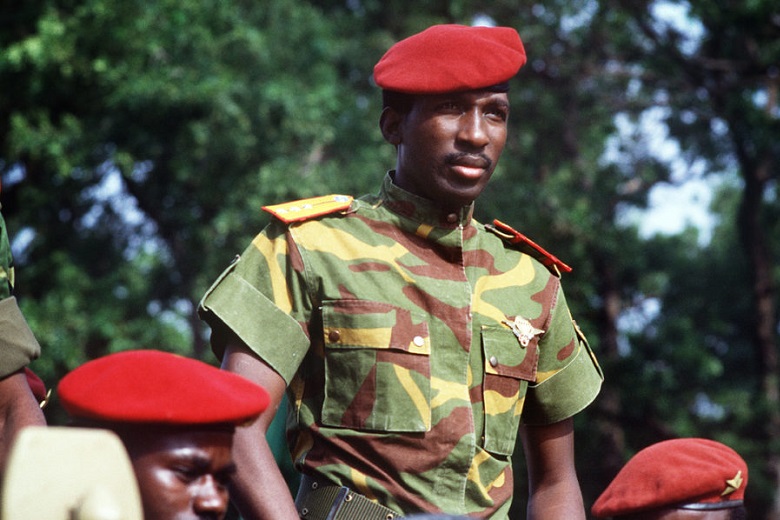No bribe, no money laundry or presidential salary, Thomas Sankara is one of the poorest African presidents. He has only four bicycles and three guitars.
On 4 August 1983, in the African state of Upper Volta, a dull, ordinary event took place – a coup d’etat. Already the fourth in the last 17 years. Power seized by supporters of the 33-year-old national army captain Thomas Isidore Noël Sankara, who was under house arrest for his Marxist-Leninist beliefs.
Thomas Sankara left the apartment and soon renamed the country “Burkina Faso” (the nation still bear the name to date) – “the land of incorruptible people”. Residents reacted to this phlegmatic – think, another junta has come. Nothing new.
Salary reduction
In Africa, local presidents usually acted like this – they seized power, executed the opposition, and after a new revolution, they fled to Europe or America with suitcases full of money. On the other hand, Sankara refused the presidential salary ($2,000 a month) and lived on the salary of an army officer ($450): he transferred the salary to an orphanage.
Further, Captain Thomas Isidore Noël Sankara did something terrible by African and even modern western standards: he sold all the expensive Mercedes in the government garage and bought Renault 5 instead – modest small cars. Officials had their salaries cut and banned from flying in business class: Sankara himself purchased plane tickets to the usual “economy” for official visits to neighbouring states.
In the terrible heat, Thomas Sankara did not equip his office with air conditioning: “If most of our people cannot afford this, it’s a shame to start such a luxury! Nothing, I’ll sweat.”
Government officials told to abandon chic European suits and wear locally made cotton tunics. Every Christmas, ministers were required to surrender their monthly salary to the poor. A bunch of officials sent to work on farms, plough the land, take care of cows – “so that they know how the common people live and how they earn their living.”
Husbands prepare dinner
The officials began to go crazy, but this was only the beginning. Sankara ordered all the men of the country to go to the market at least once a year, buy food and cook dinner for his wife: “Show her how you love her, make her life easier, understand how hard it is for her with the household and children.” Of course, 8 March was made a public holiday in Burkina Faso.
Large-scale reforms were carried out in all other areas as well – having taken away estates from large landowners, the president transferred arable land to peasants, as a result of which the wheat harvest increased 2.5 times, and the threat of hunger disappeared in the country.
Thomas flatly refused food aid to Western Europe and the United States, saying: “Nothing in this world happens just like that… whoever feeds you controls you.”
Another speech altogether frightened the West: Sankara said that in theory, Africa could refuse to pay its debts because “it is strange that the poor and the exploited give their money to the rich exploiters.” In the capital, Ouagadougou, the president opened the first supermarket in Burkina Faso’s history – with fixed food prices.
The People’s Revolutionary Tribunals established by him everywhere dealt with the cases of corrupt officials, embezzlers of the state budget and “counter-revolutionaries”: there were no executions since Thomas abolished the death penalty, but the terms were “soldered” not weak – for a bribe of $100 they gave ten years in prison.
Agricultural improvement
Stopping the advance of the desert, Thomas Sankara planted ten million(!) Trees. 2.5 million children vaccinated to prevent the spread of infectious diseases. Tribal leaders deprive of privileges and property, the collection of tribute from peasants and free work in the “leader” fields abolished. The republic stopped taking out loans at exorbitant interest rates from the IMF.
In general, the West could not bear this, especially after Sankara praises Lenin and Cuba and the USSR – no one in Europe and America was happy about the emergence of a new socialist “outpost” in Africa.
The French special services (Burkina Faso – the former colony of France) started preparing the next coup, for which they allocated severe money at that time. Those who wanted to participate in the conspiracy immediately find that the offended were both among the leaders and the corrupt officials. Some military personnel also did not like that Sankara, during a short border war with the neighbouring state of Mali, did not allow bombing the enemy’s civilian population.
Death of Thomas Sankara
On 15 October 1987, a group of soldiers attacked the residence of Thomas Sankara in the capital Ouagadougou. They headed by a close friend of the president, his longtime associate, the minister of government – Captain Blaise Compaore.
Sankara was captured and killed – the corpse was dismembered, buried in an unmarked grave. As it turned out, after the exhumation of the body in 2015, the leader of Burkina Faso shot without trial – 12 bullets fired from three types of weapons were found in the president’s remains. The putschist Compaore dreamed of accusing the late leader of corruption, but nothing happened.
Three guitars and four bicycles
During exhaustive searches in Sankara’s personal property, only a rusty Peugeot car, an ancient refrigerator, a broken freezer, three guitars, and four bicycles found. No billions of dollars in Swiss bank accounts, no Rolls-Royces, bars of gold and diamonds.
Blaise Compaoré promised people “true democracy instead of the communist regime,” stayed in power for 27 years as a standard military dictator. Finally, in 2014, he was overthrown in a popular uprising and expelled from the country. Thomas Sankara remained in the memory of the “African Che Guevara”, a real revolutionary and unmercenary, of whom there are very few among politicians. So much so that they rarely occur in nature.
